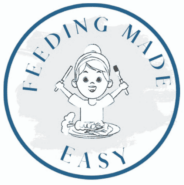Whether you’re supplementing while breastfeeding, exclusively formula feeding, or just wanting to have a back-up ready, choosing an infant formula can be a daunting task. The formula aisle is filled with competing claims all stating that their formula will make your baby stronger or smarter. How do you even get started?
No matter which formula you choose, know that your baby will be receiving all the nutrition they need. If you are feeling overwhelmed with all the information (and misinformation) regarding formula feeding, check out my book Formula Feeding Guide now available on Amazon (affiliate link).
If you’re looking for the latest information on the 2022 infant formula shortage, check here.
This post may contain affiliate links and when you click on the links I may earn a small commission at no charge to you. As an Amazon affiliate, I earn a commission from qualifying purchases.
Infant Formula Basics
In the United States, all formulas must follow specific regulations set out by the FDA. This means that no matter which formula you end up choosing, your baby will be receiving the nutrition they need!
In general, most parents start with a standard formula. These formulas work for most babies. If your baby is not tolerating the formula or has a specific diagnosis, they may need a specialty formula.
Within the standard formula categories, you also have the option of looking for organic options or non-GMO options, if that is important to you (do note that research does not indicate any nutritional difference between organic and non-organic formulas).
You may also notice a difference in the protein source between formulas. Most formulas use cow’s milk as the protein source, but there are soy options available. Recently, goat milk infant formulas have become available as well. Some formulas will have bonuses, such as prebiotics and probiotics as well.
Many stores will offer generic options of name brand formulas. These are often nutritionally equivalent, but cost much less.

Types of Infant Formula
This is by no means an exhaustive list of every type of formula. There are many specialty formulas available and many more examples of each of these than I am providing.
Standard Term Formula
Recommended for most healthy, term infants. Some examples include Similac Pro-Advance, Enfamil Neuropro, Gerber Good Start, and store brand alternatives.
Organic or Non-GMO Formula
Recommended for healthy, term infants with parent preference. Examples include Similac Organic, Earth’s Best, The Honest Company, Plum Organics.
Soy Formula
Recommended for vegan families (not recommended for premature infants or for infants with cow’s milk protein allergy). Some examples are Prosobee, Gerber Good Start Soy, and Isomil.
Gentle Formulas
Recommended for healthy infants who may not tolerate standard formulas. May have a higher percentage of whey protein or less lactose. Examples include Similac Organic A2 and Baby’s Only Gentle. Bobbie Organic Gentle is 100% partially hydrolyzed whey protein with 100% lactose for the carbohydrate source.
Partially Hydrolyzed or Sensitive Formula
Recommended for infants with some gastrointestinal discomfort on standard formulas. Examples include Enfamil Gentlease, Enfamil Reguline, Similac Total Comfort, Gerber Good Start Gentle, Gerber Good Start Soothe, Bobbie Organic Gentle.
Thickened Formula
Thickened Formulas: Recommended for infants with gastroesophageal reflux (speak with a doctor before starting). Some examples include Enfamil AR and Similac for Spit Up.
Extensively Hydrolyzed or Amino Acid Based Formula
Recommended for infants with cow’s milk or soy allergy, multiple food allergies, short bowel syndrome, malabsorption, or other reasons discussed with doctor. Some examples include: Alimentum, Pregestimil, Pepticate, Nutramigen, Elecare, and Neocate Infant.
Baby Formula Equivalent Chart
If you are unable to find your formula due to the formula shortage, your baby may be able to tolerate a similar formula from the same category. While there are some differences between formulas, many of the basic ingredients are similar and this can give you a starting place for choosing an alternative.
| Type of Formula | Uses | Examples |
|---|---|---|
| Standard | Most healthy, term babies | Aptamil First Infant, Aptamil Gold Plus, Enfamil Enspire, Enfamil Infant, Enfamil Neuropro Infant, Gerber Good Start Gentle, Nestle Nan 1 Pro, Kendamil Classic First Infant Milk, Similac 360 Total Care, Similac Advance, Similac Pro Advance, Similac Advance 2′-FL, Store Brand Infant, Store Brand Advantage Premium, Store Brand Procare |
| Organic/Non-GMO | Most healthy, term babies, parental preference | Bellamy’s Organic, Bobbie, Bub’s Organic Grass Fed, ByHeart, Earth’s Best Organic, Happy Baby Organic Infant, Kendamil Organic First Milk, Similac Organic Similac Pure Bliss, Store Brand Organic |
| Soy | Vegan, parental preference (not recommended for preterm infants) | Earth’s Best Non GMO Plant Based, Enfamil Prosobee (Simply Plant Based), Gerber Good Start Gentle Soy, Similac Soy Isomil, Store Brand Soy |
| Goat | Gentle formula, for babies who may not tolerate standard but do not have allergies | Bub’s Goat Milk Infant, Kendamil Classic First Infant Goat |
| Reduced Lactose | Marketed as gentle, however usually not necessary | Earth’s Best Organic Gentle, Earth’s Best Organic Sensitivity, Enfamil Enspire Gentlease, Enfamil Gentlease, Enfamil Neuropro Gentlease, Enfamil Neuropro Sensitive, Enfamil Reguline, Gerber Good Start Gentlepro, Gerber Good Start Soothepro, Similac Pro Sensitive, Similac Sensitive 360 Total Care, Similac Sensitive, Store Brand Sensitivity Premium |
| A2 Protein | Gentle formula, for babies who may not tolerate standard but do not have allergies | Bubs Supreme A2 Beta Casein, Care A2+, Gerber A2, Enfamil A2, Similac Organic A2 |
| Thickened | Infants with reflux (under supervision of a doctor) | Enfamil AR, Similac for Spit Up, Store Brand Added Rice |
| Partially Hydrolyzed Proteins | Gentle formula, for babies who may not tolerate a standard or A2 formula | ByHeart, Bobbie Organic Gentle, Earth’s Best Gentle, Enfamil Enspire Gentlease, Enfamil Gentlease, Enfamil Neuropro Gentlease, Enfamil Reguline, Gerber Good Start GentlePro, Gerber Good Start SoothePro, Similac Pro Total Comfort, Nestle Nan Supreme Pro, Nestle Nan Expert Pro Sensipro, Store Brand Gentle, Store Brand Complete Comfort Protein, Store Brand Tender, Bobbie Organic Gentle |
| Extensively Hydrolyzed Proteins | Cow’s milk or soy allergy, multiple food allergies, short bowel syndrome, malabsorption, or other reasons discussed with doctor | Gerber Good Start Extensive HA, Nestle SMA Althera, Nutramigen, Pepticate, Pepticate Syneo, Pregestimil, Similac Alimentum, Store Brand Extensively Hydrolyzed |
| Elemental/Amino Acid | Cow’s milk or soy allergy, multiple food allergies, short bowel syndrome, malabsorption, or other reasons discussed with doctor and who do not tolerate extensively hydrolyzed formula | Alfamino Infant, Elecare for Infant, Neocate Infant, Neocate Syneo, Puramino Infant |
Purchasing Options
Within each type of formula, you also have some options on how to purchase it. For the most part, this comes down to preference. The easier it is on you, the more expensive it will be, so you’ll need to do a cost-benefit analysis.
Ready to Feed
This is a done for you option. The formula is already mixed and all you need to do is pour it into a bottle and serve. It also comes sterile, which is great if your baby is at increased risk for infection. This will be a more expensive option, but can be very convenient, especially if you know you will be in a situation where you won’t be able to mix.
Liquid Concentrate
This is not an option for every formula. You will need to dilute this formula with water, but it is also sterile, like the ready to feed option.
Powder
Generally, this is what most people choose. It is the cheapest option, but also the most labor intensive, since you will need to measure the powder and water (Read this to figure out which water to choose). It is not sterile, so may not be appropriate for very high risk babies (always talk to your doctor).
How to Actually Choose
Start with a standard formula. You can start with a name brand or a store brand, whichever is easiest for you to find. Let your baby try it for a while. It may take a little bit for their stomach to get used to a change, if they’re used to breast milk (if you notice serious side effects like blood in the stool, speak with your doctor immediately).
If your baby is still having problems with the formula, you can try a new formula. Give your baby time to adjust (2-3 weeks) to the new formula before switching. Many parents switch formulas repeatedly in a short amount of time, never giving their baby time to adjust. If standard formulas aren’t working, you can move to gentle, then sensitive. If your baby is still having tolerance problems on a sensitive formula, it may be worth mentioning to your pediatrician.
You can check out this algorithm for choosing a formula if you’re a visual learner or this guide if your looking for more information on formula feeding. If you’re looking for more information on how to feed your infant, check out my courses!

Krystyn Parks is a Registered Dietitian and Lactation Consultant who specializes in feeding children. She has a Master’s Degree in Nutritional Science from California State University Long Beach. She is an International Board Certified Lactation Consultant and has been registered with the Commission on Dietetic Registration since 2013.
